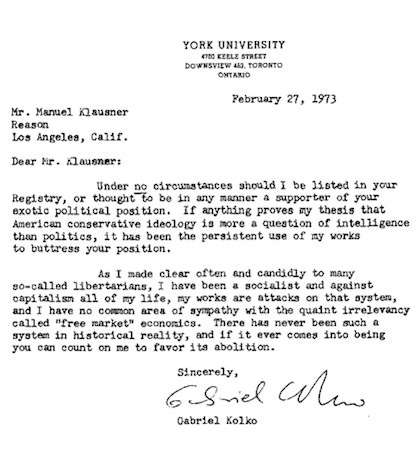Gabriel Kolko, RIP
The death of a radical historian
The leftist historian Gabriel Kolko has died at age 81. He wrote many books that drew interest from libertarians, from Railroads and Regulation (1965), on the early history of the Interstate Commerce Commission, to The Limits of Power (1972), on the early history of the Cold War. But the Kolko book that libertarians love to invoke the most is The Triumph of Conservatism (1963), his history of the Progressive Era. Pushing back against liberals who celebrate the first two decades of the twentieth century as a time when the government finally started to tame big business, Kolko made a strong case that big business had in fact played a major role in designing and imposing the new regulations. In this way, he showed, companies were able to contain competition that could not be stopped by market means. "As new competition sprang up," he wrote, "and as economic power was diffused throughout an expanding nation, it became apparent to many important businessmen that only the federal government could rationalize the economy….[I]t was not the existence of monopoly that caused the federal government to intervene in the economy, but the lack of it."
Since The Triumph of Conservatism was published, we've seen half a century of scholarship on the Progressive Era; Kolko's book is by no means the last word on the period. But it's a fine entry point into that scholarship, a disinfectant that clears away both liberal myths about benevolent reformers and conservative myths about independent, market-loving businessmen. And it was a watershed moment in the New Left's emerging critique of the corporate state, a critique that converged with arguments coming from free-market libertarians.
Kolko was initially puzzled by this convergence. In 1973, when Reason was assembling a list of college professors whose courses might be of interest to libertarian students, Kolko reacted with this letter:

Over time this attitude softened, and Kolko came to speak favorably of libertarian scholarship on such subjects as the New Deal. And in his 2006 book After Socialism he firmly rejected the socialist tradition, though he did not leave the left. "After Stalin, Mao, and Blair, socialism is today irreversibly dead both in practice and theory," he wrote, then added that "capitalist theories are no less erroneous and irrelevant."
So that's where the scholar stood at the end of his life. His scholarship, meanwhile, had much to teach both the socialists and the capitalists whose ideas he dismissed. Requiescat in pace.


Show Comments (10)